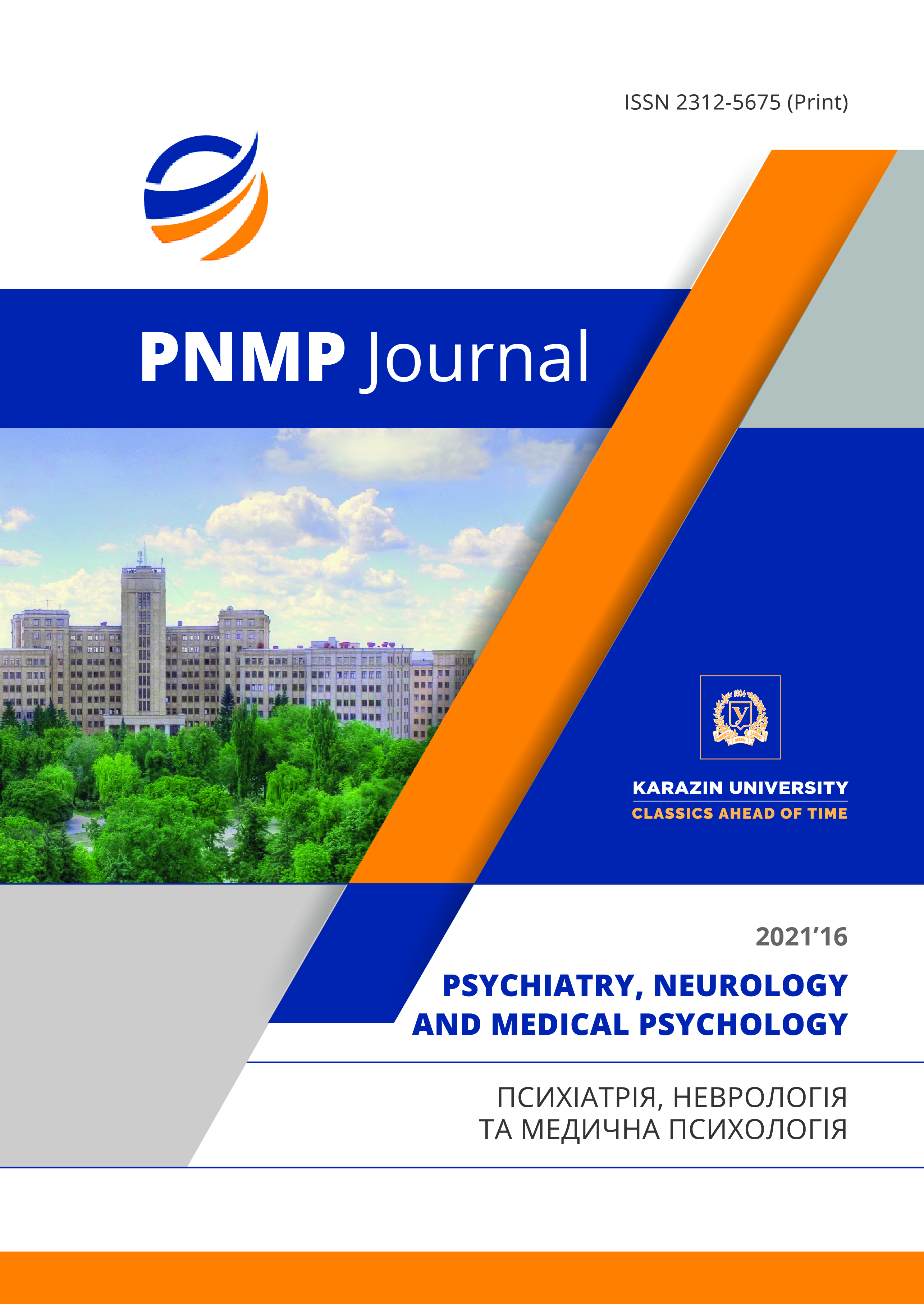Psychoneuroimmunological aspects of post covid19 syndrome
Abstract
A sample screening study was conducted by anonymous questionnaire of 223 adult outpatients with signs of post COVID19 syndrome (PCS) from 1 to 3 months after the disease. Among the respondents 77.6% are men, 22.4% are women of different ages. Young and middle-aged people predominated. 77.3% of them were treated on an outpatient basis. 89.6% of respondents had mild to moderate disease. Viral pneumonia was diagnosed in 28.2%. Respiratory distress syndrome survived 5,8%. Re-infection of SARS-CoV-2 had 3,5%. Prolonged low-grade fever (more than 4 weeks) after the disease was maintained at 33.6%; in 15,6% revealed immunosuppression of the cell and phagocytosis. 75% were diagnosed with long-term fever of non-infectious origin. Complete recovery from 2 to 4 weeks was noted by 82.9%. Three months or more required 19,2% for convalescence. They were dominated by signs of CFS and psycho-emotional imbalance. Regarding cognitive disorders, the greatest difficulties arose with the perception of information in 12.7%, with its analysis in 9.8%, with decision-making in 8%. 25.9% of respondents note mnemonic disorders. Attention disorders occurred in 24.9% of respondents. Among the most pronounced mental states that manifested themselves in the post COVID19 period are: anxiety was: high level - 21%, medium level – 26.6%, low level – 40.7% of respondents, as well as irritability: severe – 37.5 %, expressed – 27.2%, weakly expressed – 35.3%; confusion: severe – 36.6%, severe – 19.1%, mild – 44.1%; depressive disorders: severe – 36.5%, severe – 19.1%, mild – 44.1%; fear, despair, apathy: strongly expressed – 33.9%, expressed – 26.3%, weakly expressed – 39.8% of respondents; panic, panic attacks was: high level – 41%, medium level – 14,1%, low level – 44.9%, hysteria: strongly expressed – 42.7%, expressed –13.5%, weakly expressed – 47.6%; aggression, anger, irritability: strongly expressed – 41.9%, expressed – 18.9%, weakly expressed – 39.3% of respondents. A change in the value-semantic component of personality has been recorded. Thus, 38.9% of respondents became more aware of the value of life, 17.2% had a positive attitude towards the world.
Downloads
References
Word Health Organization: Report of the WHO China Joint Mission on Coronavirus Disease 2019 (COVID19). Geneva, WHO. 16-24 February, 2020.
Couzin Frankel J. The long Haul. Science. 2020, vol. 369, no. 6504, pp. 614-617.
COVID-19 rapid guideline: managing the long-term effects of COVID-19. NICE guideline. 2020, p. 35.
Sheehy L.M. Considerations for postacute rehabilitation for survivors of COVID-19. JMIR Public. 2020, vol.6, no. 2, e19462. https://www.doi.org/10.2196/19462
Matthew E Levison, Commentary: What We Know So Far About Post-COVID Syndrome. Merck Manual. 2020.
Carfi A., Bernabei R., Landi F. et al. Persistent symptoms in patients after acute COVID-19. JAMA. 2020, no. 324 (6), pp.603-605. https://www.doi.org/10.1001/jama.2020.12603
H. Weerahandi, K. A Hochman, Е. Simon et al. Post-discharge health status and symptoms in patients with severe COVID-19. BMJ Yale. 2020. https://doi.org/10.1101/2020.08.11.20172742
Pylypenko V.M. Neuroendocrine disorders in COVID 19 and postcoid syndrome and prospects for the use of drugs - aminobutyric acid. Health of Ukraine of the 21st century. 2020, no. 23 (492), pp. 22-25. [in Ukr.]
Sanwang Wang B.A. Xin Wen B.A. Yingying Dong B.A. et al. Psychological impact of coronavirus disease 2019 (COVID-19) on the general public, health care workers and patients with mental disorders and its measures. Psychosomatics. 2020, vol. 61, no. 6, pp. 616-624. https://www.doi.org/10.1016/j.psym.2020.05.005
Komaroff A. The tragedy of the post-COVID “long haulers”. Harvard Health Letter. 2020.
Tenforde MW, Kim S., Lindsell CJ, et al: Disease duration and risk factors for delayed return to normal health among outpatients with COVID-19 in several public health systems. MMWR. 2020, vol.69, no. 30, pp. 993-998. http://doi.org/10.15585/mmwr.mm6930e1
D. Yelin, E. Wirtheim, P. Vetter, A. C. Kalil. Long-term consequences of COVID-19: research needs. The Lancet Infectious. 2020, vol. 10, pp.1115-1117. https://www.doi.org/10.1016/S1473-3099(20)30701-5
Ceravolo MG, de Sire A, Andrenelli E, Negrini F, et al. Systematic rapid "living" review on rehabilitation needs due to COVID-19. Eur J Phys Rehabil Med. 2020, vol. 56, no. 3, pp. 347-353. https://www.doi.org/10.36425/rehab34148
Gemeli. Against COVID-19 Post Acute Care Study Group. Post-COVID-19 global health strategies: the need for an interdisciplinary approach. Aging Clinical and Experimental Research . 2020, vol. 32, no.1613-1620. https://www.doi.org/10.1007/s40520-020-01616-x
Mishchykha L.P., Kulesha-Lyubinets M. Mental health as a component of personal well-being. Collection of scientific works. 2020, no. 1, pp. 166-161. [in Ukr.]
Yakubovska O.I. Neuroendocrine aspects of the use of thymus hormone analogues. Art of Medicine. 2017, no. 3, pp.78-85. [in Ukr.]

